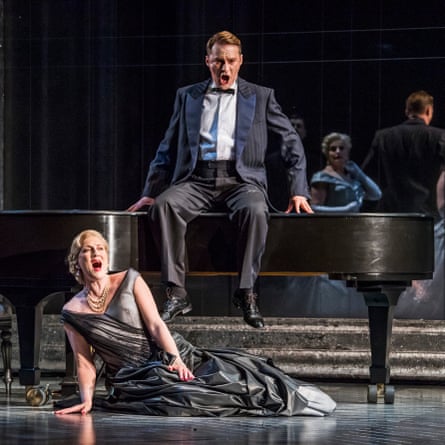‘Somehow the opera itself has grown immeasurably with time,” director Keith Warner writes in a programme note for his new Glyndebourne staging of Samuel Barber’s Vanessa, a work much neglected after its New York premiere in 1958, but which in recent years has come into its own. Its first critics, hankering after the creation of an American operatic style in the wake of the McCarthy era, deemed Barber’s post-Romantic idiom, and his choice of a subject he considered universal rather than national, to be overly dependent on European models. The slow process of re-evaluation, however, has focused on the work’s emotional directness and its often remarkable dramatic cogency.
Setting a libretto by Barber’s partner, Gian Carlo Menotti, Vanessa examines the conflicts and disparities between romantic idealism and emotional reality in the lives of three women immured in a remote mansion in an unspecified “northern country”. After waiting 20 years for the return of her former lover Anatol, Vanessa finds herself confronted by his son of the same name, to whom she becomes obsessively drawn, oblivious to the fact that he is a shameless opportunist. He, meanwhile, seduces Vanessa’s niece Erika, whose growing desire for him is tempered by her awareness of his inability to love, and who determines not to bear his child when she discovers she is pregnant. Watching and judging is Vanessa’s mother, the Baroness, a formidable arbiter of moral truth, who refuses to speak to anyone she considers to be living a lie.

Barber and Menotti set their opera in the fin-de-siècle world of 1905. Warner, however, updates it to the time of composition and explores its secrets, lies and evasions by drawing on the imagery of 40s and 50s thrillers and film noir. A hall of mirrors, reminiscent of Orson Welles’ The Lady from Shanghai, reflects back on the characters the unpalatable truths they are unwilling to face, while the gender polarities of Hitchcock’s Vertigo are reversed as Emma Bell’s Vanessa tries to make over Edgaras Montvidas’s Anatol in the image of his father. Questionably, however, Warner suggests backstories that Barber and Menotti leave unspoken. Flashbacks reveal that Rosalind Plowright’s Baroness was once involved with the local Doctor (Donnie Ray Albert). There are hints that Virginie Verrez’s Erika may not be Vanessa’s niece at all, but her illegitimate daughter by the elder Anatol. Warner’s interventions muddy the narrative in places, but nevertheless this is intelligent music theatre that proves consistently gripping.
Musically, it’s hugely impressive, too. Bell gives one of her finest performances to date, beautifully acted, her voice soaring with elation and anguish, even as Vanessa becomes increasingly deluded as to Anatol’s true nature. Montvidas is all seductive elegance, but his charm can turn to cynicism in a flash when his guard is down, and we fully understand why Verrez’s proud, sensual Erika finds him both so attractive and so suspicious. Plowright strikingly suggests a woman whose view of the present is haunted by the sadness of her own memories, while Albert convinces as a man who can mend men’s bodies, but singularly fails to understand their souls. Jakub Hrůša, conducting with tremendous passion, really opens the emotional floodgates, sweeping us away in the big set pieces, while the London Philharmonic Orchestra’s playing is at once sumptuous and superbly detailed.
- At Glyndebourne, Lewes, until 26 August.

Comments (…)
Sign in or create your Guardian account to join the discussion